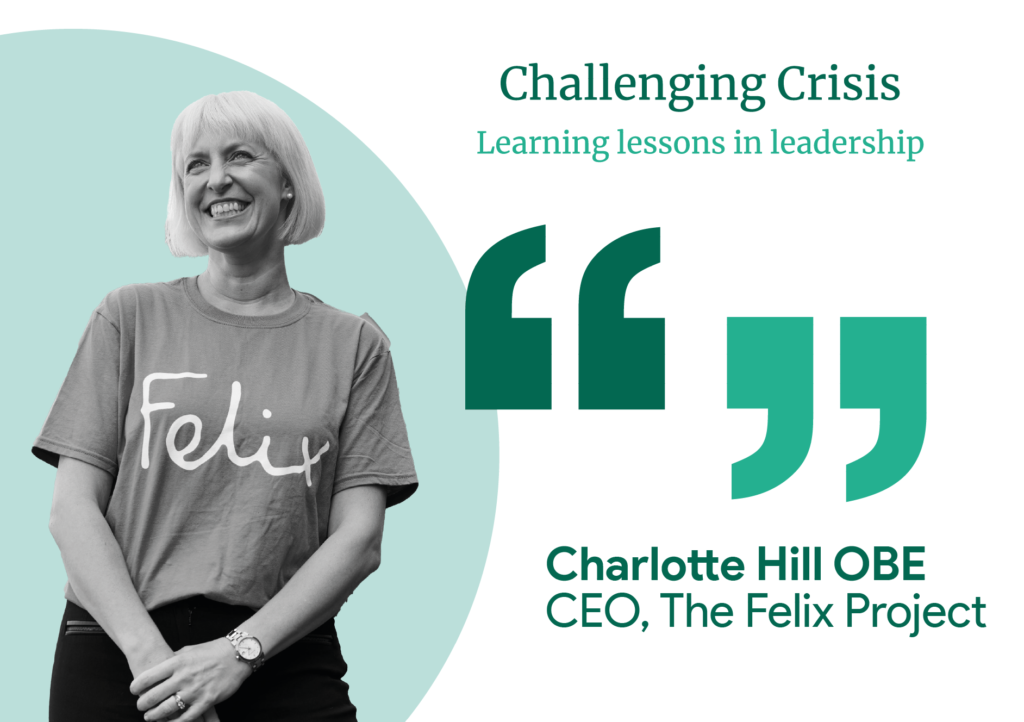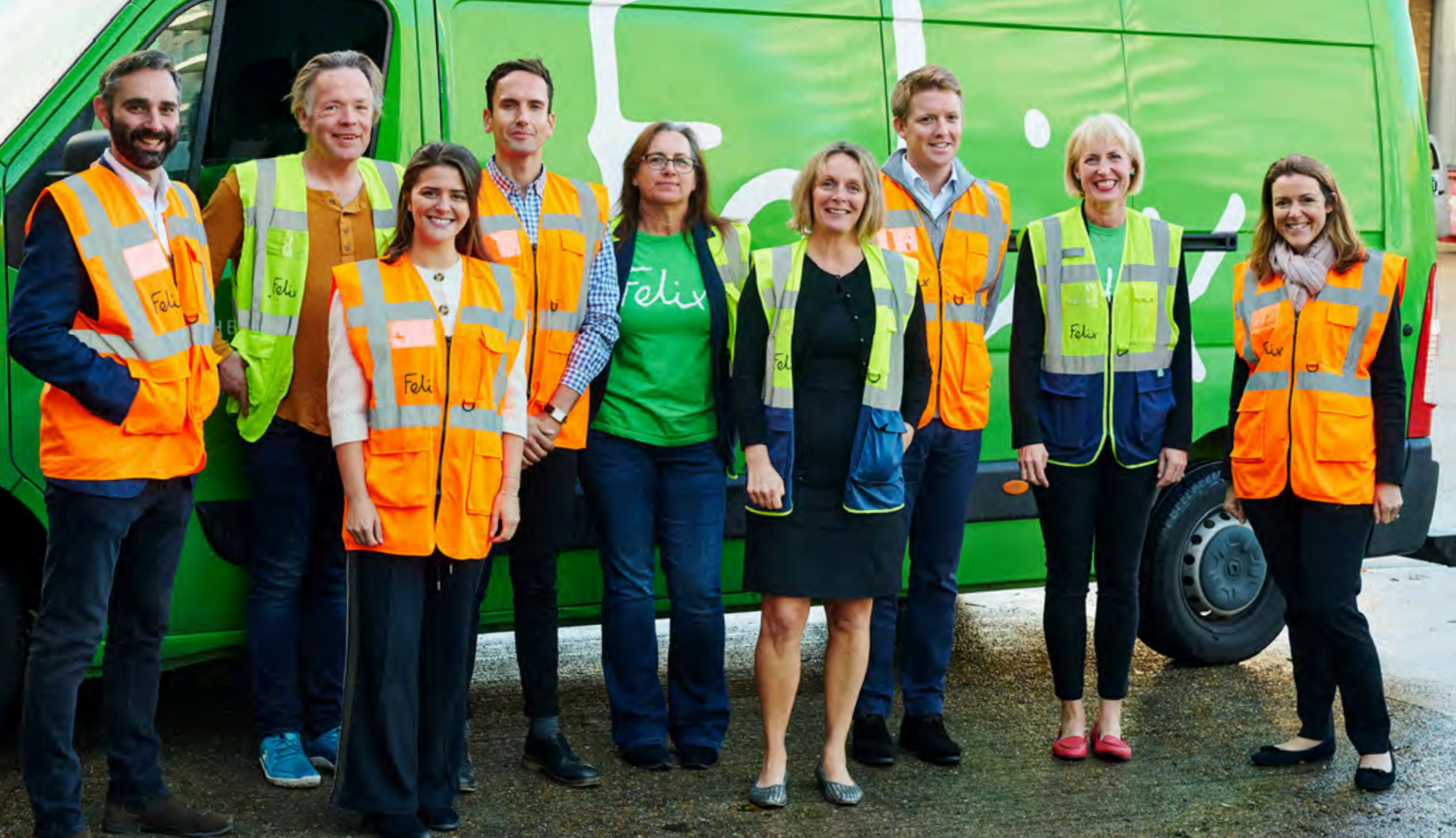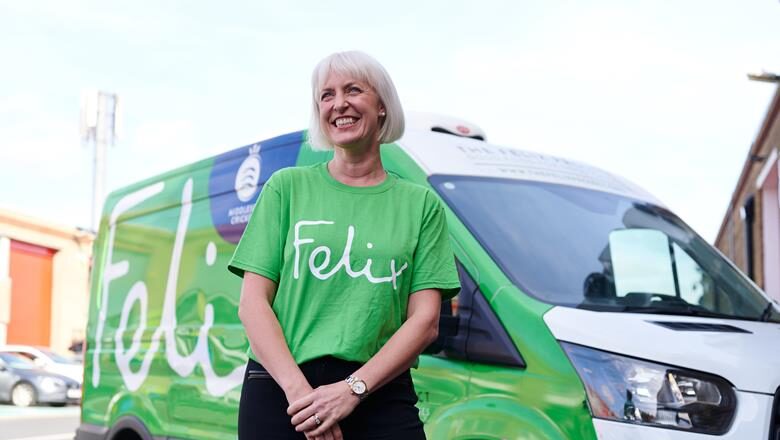
As we approach Volunteers Week, Saxton Bampfylde is delighted to bring you the first instalment in our series of interviews with senior leaders across the social impact sector.
We live in a time of combined crises – post-pandemic, food insecurity, cost-of-living, staff resourcing, international conflict, energy shortages and economic uncertainty (to name a few) – and our leadership has been challenged like never before.
In a time of crisis, leaders must consider more than ever the purpose mission of their organisations and the people that they include in their staff and supported communities, but crisis does indeed present an opportunity to review, re-evaluate and reconsider how they have worked before and what can and should work better.
In this series we talk to inspiring figures leading different socially impactful organisations to learn how they have faced crisis, learned and evolved. By selecting interviewees with different backgrounds, career paths and experiences in our varied and vibrant sector, we showcase the leaders and organisations responding to crisis situations across the UK and beyond.
18 months into her role, we are grateful to Charlotte Hill OBE, CEO of The Felix Project for sharing her honest and open experiences and learnings in our first interview.
Charlotte, you joined the Felix Project as CEO in January 2022 as society was still hugely impacted by the pandemic. Food security was a huge challenge as a result of this, only to be further impacted in the following 12 months. Considering this backdrop what have you prioritised in your first year and half as CEO?
I think people automatically presume that food security challenges and the pandemic have caused the biggest impact, but actually the cost-of-living crisis that we’re currently in is putting more strain and demand on the organisation, particularly in terms of the need for food.
We support about 1000 community organisations across the Felix Project and every single one of them is asking for more food and we now have a waiting list of a further 600 community organisations who we cannot support at this point. Since September those numbers have really gone up and that is largely because breakfast and after school clubs at primary schools in London desperately need to feed children because they’re coming to school hungry as their parents can’t afford to feed them.
The people we are supporting with food is changing. We originally set up Felix’s kitchen, where we turn surplus food into meals. Now what we’re increasingly finding is that we are supporting people who can’t afford to turn on their cookers. And these are not people on the margins of society. We recently did a poll with YouGov of low paid working Londoners and found that four in ten parents were having to skip meals themselves so they could feed their children. These are key workers, teaching assistants and nurses, for example. We are a capital city in an emergency and this cost-of-living crisis is deep and I think the effects of it will be felt for a very long time.
What is always front of mind is how can we be the most effective, efficient organisation to have as much impact as possible during these really tough times. But also, really importantly, as a leader I am always thinking about how I look after the well-being of my colleagues. Many of whom came out of a very, very, busy period during the pandemic and have gone into an incredibly busy period during the cost-of-living crisis. That’s been a priority for me: how we do things well and safely, but also how we look after our people.
“I also genuinely feel that it is important that I show I am human too and reveal vulnerability and admit that situations are hard – I think good leadership really needs this honesty and to show it is okay to ask for help.”
How does this experience reflect other instances or periods of crisis that you have faced in other organisations? Are there common learnings or themes you would highlight?
Sadly, there are lots of instances as a chief executive, where you have to lead through crisis. That might be to do with global or other external factors that are not strictly in your control but have an impact. As a leader you need to get used to being buffeted by external forces or dealing with some form of crisis.
It is very much part of the job and my first instincts have always been: how do I look after the organisation and my colleagues? How do I make sure everybody has got the support they need? Do they know where to go for help? I want to always ensure they are looked after. But as a leader you also have to know where to go for your own support, as it can be incredibly lonely dealing with it.
I have a brilliant group of fellow chief executives of other charities, and we lean on each other for support, advice and sharing during good and tougher times. It is important to have those coaches, mentors or people who can give you that support.
I also genuinely feel that it is important that I show I am human too and reveal vulnerability and admit that situations are hard – I think good leadership really needs this honesty and to show it is okay to ask for help.
You are a vocal advocate of partnership working – how and why will this help us to address societal challenges? What is needed to make partnership working more positive and successful?
I believe no matter what organisation you’re running or whichever sector you’re in, if you are trying to tackle really big societal challenges there is no one organisation that can do that alone. It’s really important to know what you’re good at and to focus on doing that really well. That will also mean you know where you are less good, or have less capacity or skills and that helps identify the partners you want to be working with.
At the Felix Project our vision is of a London where no good food is wasted and no Londoner goes hungry. To achieve this, we are currently tackling two huge areas: food waste and the impact it has on our environment and sustainability; and the issue of people living in food insecurity. We cannot address these through our organisation alone, so we have to work with others to achieve those goals.
Partly, there is a really practical element to it, where people have the skills, experience and networks to help. But further to that I have always been a passionate advocate for cross-sector working. Some of the very, very best partnership work we do is with the private sector or with very different public sector organisations from us. We are doing loads of work with our food supply partners and these can be from farms to supermarkets to large and small food businesses. It’s an amazing partnership model because we are helping them solve a problem by taking away their perfectly edible and good food, that would otherwise go to landfill and helping them have social impact with that.
“I believe no matter what organisation you’re running or whichever sector you’re in, if you are trying to tackle really big societal challenges there is no one organisation that can do that alone.”
We are also helping by offering volunteering opportunities. We have 8500 volunteers across our depots and kitchen and our partner businesses love their colleagues volunteering because they really understand the social good they’re undertaking. Through our partnership work we benefit because we get the food, which means that we can feed those in London who need it.
But it is very much a collaboration and that’s the thing I always think: we know our value, we know what we bring to the table and we know we do it really well. There is a mutual respect which is really important. My colleagues and I learn so much from working with other organisations and seeing how they do things and it is a great way for us all to learn and develop personally and organisationally.
The Felix Project has gained significant profile and increased income and collaboration over the past three years – what has contributed to this and how do you sustain that momentum?
It’s a really good question and actually this is where partnership is super important. For example, one of our key partnerships has been with The Evening Standard since 2016. The publication and editorial team has been a tremendous support and helped us really raise the profile and let people know about the Felix Project and what we do. So many of the volunteers who’ve come to us heard about us through the Evening Standard. It has also helped us fundraise too, which is vital.
The partnerships with our food suppliers and over 1000 amazing community organisations that we work with all across London have provided such momentum. Those organisations are our superpower. They use that food to drive social good, supporting so many different people in a variety of circumstances. The food we supply is one part, but there is so much more to it and they are truly remarkable in what they do.
This is an organisation born out of tragedy, established as a legacy to Felix Byam Shaw: a remarkable young man who died aged 14 and who always thought of others with compassion and a desire to help. It is something we think about all the time; I think about Felix every day and we all want to deliver the best legacy for him. So, that does mean as well as being a really amazingly professional logistics organisation, which is what we are really, there is also a feeling of magic that is sprinkled across everything that we do and the community that we support. That is really one of the real secrets as to how this organisation has grown in profile and impact.
Community is a cornerstone of the Felix Project, but you are dealing with such a diversity of people from staff, suppliers, donors, families, organisations and individuals. How do you maintain and deliver on your community values?
The magic of the Felix Project is bolstered by the incredible community of people we work with – volunteers, community organisations and food suppliers. It is a community of people coming together to make sure we deliver our vision of a London where no good food is wasted and no Londoner goes hungry.
For me that is a really important part of leadership, making sure that everyone knows where we’re trying to get to and what their part is in getting there. To feel part of a really powerful community trying to drive that change and make that impact has been a really big part of why we have grown as an organisation: ultimately because everybody wants to.
We are a very strong values driven organisation, but we have got more to do to ensure that our workforce and our volunteer base also reflect a much greater level of diversity. We’re doing some great work with Mission 44, Lewis Hamilton’s Foundation, looking at how we get young people from all sorts of backgrounds across London involved in our work as volunteers, but also thinking about moving them into employability through apprenticeships, for example.
A great partnership we have is with Beyond Food who support people out of homelessness and into jobs in the hospitality sector and we have apprentices in our kitchen who are supported through that partnership.
“To feel part of a really powerful community trying to drive that change and make that impact has been a really big part of why we have grown as an organisation: ultimately because everybody wants to.”
We are always working really hard to think about how communities are represented in our volunteer force and in our workforce. We are doing a huge amount in our kitchen, for example, to make sure we do culturally appropriate food for the people of East London. It is like an invention test every day because the amazing chefs don’t know what surplus food is going to come through the door but what we want to make sure that those in the vulnerable communities we’re serving are getting food that actually they love, which is delicious and nutritious, and also culturally appropriate.
Education is also important for our communities and we are starting this from a very young age, through the Felix Food Fighters. This is based in primary schools and we are trying to help young people understand how to prevent food waste and discuss it with their parents and carers. It is very much framed around us all helping to save the planet, rather than food insecurity to destigmatise that idea. We are looking to build communities of ambassadors and champions from a very young age.
What lessons have you learned as a leader operating during a crisis period?
Ultimately, I think you have to discover what it is that tops you up as a leader. What is it that gives you energy. Whether it be running, singing, dancing, anything as long as it makes you happy. You need to prioritise making space in your week for that so you can look after yourself and your own well-being, otherwise you can’t look after the people in your organisation too.
It is also important to know where you have support and who you can ask for help, so you don’t feel like you’ll have you have to do it on your own. One of the places that leaders should look for help and support is the Board of Trustees – they are here on the journey with you. They are here to challenge and support – that is important to remember.
Charlotte Hill OBE
Biography
Charlotte Hill OBE joined The Felix Project in January 2022. Prior to that Charlotte was the Chief Executive of Step Up To Serve, the organisation that coordinated the #iwill campaign, from 2014 to 2020. From 2010 to April 2014 she was the Chief Executive of UK Youth, having become CEO during the charities centenary celebrations. Before that Charlotte was Advocacy and Communications Manager at the charity for 18 months.
After studying Political Science & Philosophy at Birmingham University and working part time for Richard Burden MP during her studies, Charlotte started her career working in Parliament for Rt. Hon. Harriet Harman QC MP in a number of roles. After five years with Harriet Harman, Charlotte moved to the National Society for the Prevention of Cruelty to Children (NSPCC) as their Parliamentary Advisor.
After the NSPCC, Charlotte moved to Australia and worked for a Government Relations & Communications Consultancy and for a children’s charity in Sydney. She then worked in Cambodia on her way back to the UK, teaching English in an orphanage. She joined UK Youth in April 2009. Alongside her Trustee role at EFL Trust, Charlotte is an RSA Fellow and a Board member of Westminster House Youth Club in her local area. In 2012 Charlotte received the award of “Rising CEO Star” at The Charity Times Awards.

